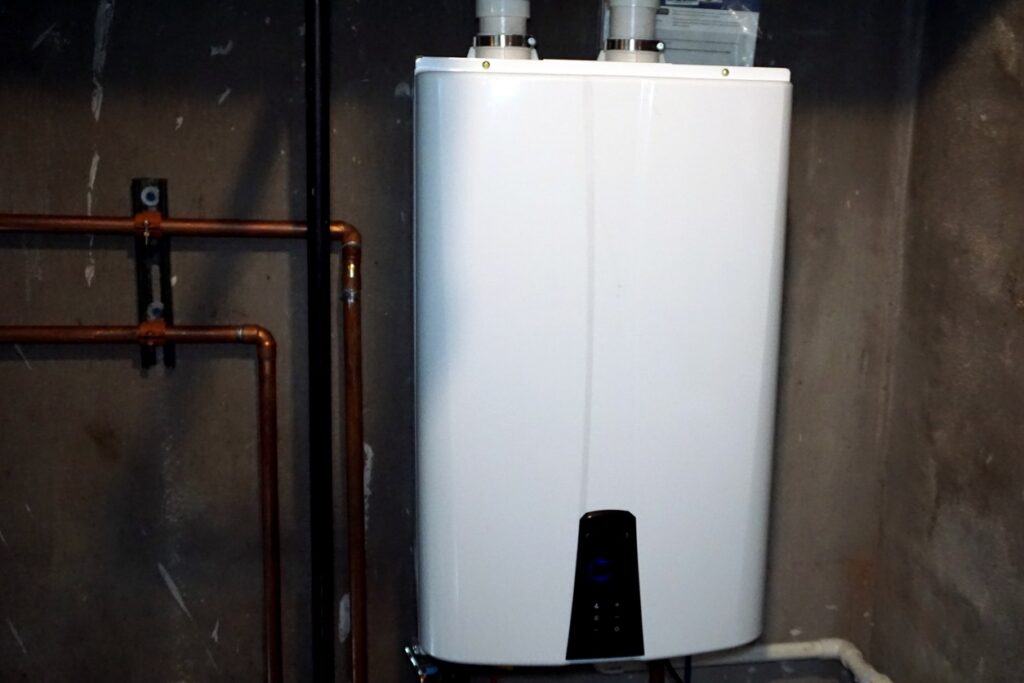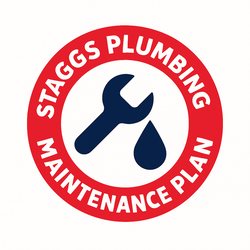
Staggs Plumbing is Plano’s trusted water heater specialist that helps homeowners choose the perfect system for lasting comfort and energy savings. With over 30 years serving North Texas families since 1990, our master plumbers (License #M-17697) have installed and serviced thousands of water heaters across the region.
When your hot water system needs upgrading, the decision between tank and tankless technology affects your daily comfort, monthly energy bills, and long-term home value. This comprehensive comparison addresses the top concerns Plano homeowners face: upfront costs, energy efficiency, and reliability. Whether you’re researching options or ready to upgrade, understanding these key differences ensures you make the best investment for your family’s needs. For expert water heater replacement services in Plano, our certified technicians provide personalized recommendations based on your home’s specific requirements.
Quick answers for Plano homeowners:
- Service area: Plano, Frisco, McKinney, Allen, Richardson
- Response time: Same-day service available
- Experience: 30+ years, Master Plumber License #M-17697
- Consultation: Free in-home estimates with upfront pricing
Understanding Traditional Tank Water Heaters
How Tank Systems Work
Tank water heaters store and continuously heat 20 to 80 gallons of water in an insulated storage tank. When you turn on a hot water tap, pre-heated water flows directly from the tank to your faucet, shower, or appliance.
These systems have served American homes reliably for decades, offering consistent hot water delivery that many families depend on. The storage approach means hot water is immediately available whenever needed, making them ideal for households with predictable usage patterns.
Tank Water Heater Advantages
- Consistent Supply: Large storage capacity provides steady hot water flow for multiple simultaneous uses
- Lower Upfront Investment: Generally cost $800-$1,500 less than tankless systems for purchase and installation
- Simple Maintenance: Annual flushing and basic part replacements keep systems running efficiently
- Familiar Technology: Most plumbers can service and repair tank systems quickly and affordably
Tank Water Heater Limitations
- Higher Energy Costs: Continuous heating and reheating increases monthly utility bills by 15-25%
- Space Requirements: Units require 6-8 square feet of floor space in utility areas
- Shorter Lifespan: Average 8-12 years before replacement needed
- Recovery Time: Takes 30-60 minutes to reheat tank after depletion
Exploring Modern Tankless Water Heaters
On-Demand Heating Technology
Tankless water heaters heat water instantly as it flows through the unit using high-powered gas burners or electric elements. Cold water enters the system, passes through a heat exchanger, and emerges hot at your desired temperature.
This on-demand approach eliminates the energy waste of maintaining a large tank of hot water 24/7. The compact, wall-mounted units free up valuable floor space while providing endless hot water when properly sized for your home.
Tankless Water Heater Benefits
- Energy Efficiency: 20-30% lower energy costs due to on-demand heating
- Space Savings: Wall-mounted units free up 6-8 square feet of floor space
- Longer Lifespan: Quality units last 15-20 years with proper maintenance
- Endless Hot Water: Never run out during long showers or multiple uses
Tankless System Considerations
- Higher Initial Cost: Units cost $2,000-$4,500 more including installation upgrades
- Flow Rate Limits: May struggle with 3+ simultaneous high-demand uses
- Complex Installation: Often requires electrical panel or gas line upgrades
- Specialized Service: Requires technicians trained in advanced diagnostics
Key Decision Factors for Plano Homeowners
| Factor | Tank Water Heater | Tankless Water Heater |
|---|---|---|
| Upfront Cost | $1,200 – $2,500 installed | $3,500 – $6,000 installed |
| Annual Energy Cost | $400 – $600 typical | $300 – $450 typical |
| Lifespan | 8-12 years average | 15-20 years average |
| Space Required | 6-8 sq ft floor space | 2 sq ft wall space |
| Hot Water Capacity | Limited by tank size | Unlimited (flow rate limited) |
Household Size and Usage Patterns
Your family’s hot water consumption directly impacts which system performs best. Families with 4+ members often benefit from tank systems’ large storage capacity during peak morning and evening usage.
However, households with staggered schedules or lower overall consumption may find tankless systems more economical. Consider your daily patterns: Do multiple family members shower consecutively? Do you run dishwashers and washing machines simultaneously?
Addressing Common Homeowner Concerns
Cost and Budget Worries
The higher upfront investment in tankless systems concerns many homeowners, but long-term savings often justify the initial expense. Our financing options include:
- 0% interest for qualified buyers
- Extended payment plans
- Energy rebate assistance
- Trade-in credits for existing units
Installation Complexity and Disruption
Professional installation minimizes disruption and ensures optimal performance. Our certified technicians handle all necessary upgrades including electrical panel modifications, gas line sizing, and venting requirements. Most installations complete within 4-6 hours with minimal home disruption.
Reliability and Service Concerns
Both systems provide reliable hot water when properly maintained and professionally installed. Staggs Plumbing offers comprehensive service plans covering annual maintenance, priority emergency service, and extended warranties. Our 30+ years serving Plano families demonstrates our commitment to long-term customer satisfaction.
Making Your Water Heater Decision
Choose Tank Water Heaters If:
- Budget is the primary concern
- Multiple family members need hot water simultaneously
- Utility room space is available
- Simple maintenance is preferred
Choose Tankless Water Heaters If:
- Long-term energy savings are important
- Space is limited in utility areas
- Environmental impact is a concern
- You want the latest technology
Professional Installation and Service in Plano
Staggs Plumbing has served Plano families since 1990 with expert water heater installation, repair, and maintenance services. Our master plumbers stay current with the latest technology and local codes, ensuring your investment provides years of reliable service.
We offer free in-home consultations to assess your specific needs, explain options clearly, and provide upfront pricing with no hidden fees. Our service includes proper sizing calculations, code-compliant installation, and comprehensive warranties on both labor and equipment.
Frequently Asked Questions
Q: How long does water heater installation take?
A: Tank replacements typically take 2-4 hours, while tankless installations require 4-8 hours depending on necessary upgrades.
Q: Do I need permits for water heater installation in Plano?
A: Yes, Plano requires permits for water heater installations. We handle all permit applications and inspections.
Q: What size water heater do I need?
A: Tank size depends on household size and usage patterns. Our technicians perform load calculations to determine optimal capacity.
Q: Can I switch from tank to tankless?
A: Yes, though it may require electrical or gas line upgrades. We assess your home’s infrastructure during consultation.
Ready to Upgrade Your Water Heater?
Whether you choose the proven reliability of a tank system or the modern efficiency of tankless technology, professional installation ensures optimal performance and longevity. Contact Staggs Plumbing today for your free consultation and personalized recommendation.
Our master plumbers provide honest assessments, transparent pricing, and expert installation backed by comprehensive warranties. Call 972-833-8660 to schedule your consultation and discover which water heater system best serves your Plano home’s needs.
Content written & reviewed by the Staggs Plumbing staff
If you enjoyed this article, check out these other articles regarding Water Heater:
Water Heater Maintenance Tips: Prolonging the Lifespan of Your Water Heater
Choosing the Right Water Heater for Your Home: A Comprehensive Guide


